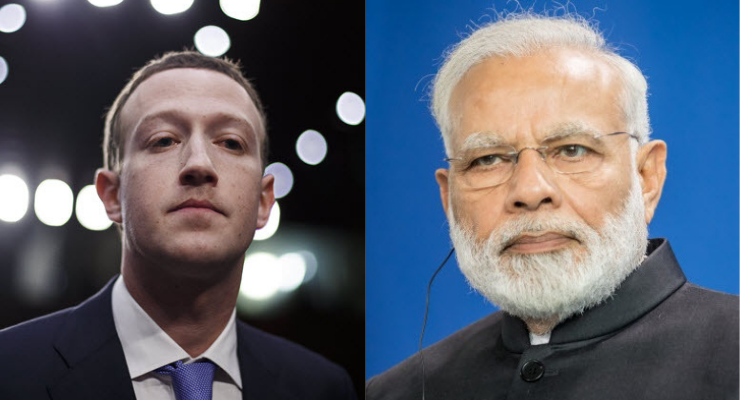
For the US tech giants, this week’s spat with Australia has been a minor distraction. In India right now, the fight is existential. Just as the Morrison government realised it needed Facebook more than Facebook needed it, in India it seems to be becoming clear that it’s precisely the other way around.
Overnight the Indian government announced new rules to give itself tighter control over online content, particularly aimed at social media (but wrapping in digital news media), including the power to order the taking down of content which the government believes breaches “norms of journalistic conduct”.
Far from the Australian to-and-fro over sharing out dollars between old media and big tech, the fight in India is the front line in the battle over the splinter-net — the fracturing of the US domination of the internet into a multi-polar world with China building one parallel universe and, now it seems, India building another, all with its own locally enforced content rules and platforms.
In each case, it’s driven by the politics of a ruthless ruling party keen to ensure the social media web aligns with its interests.
To clear the way, India’s ruling party has to break up with its old friends. For the past decade, the Hindu populist Bharatiya Janata Party (BJP) has ridden the wave of the mobile and social web to electoral success. Now, on the same day that Australia’s government backed down to Facebook (or vice-versa depending on your priors), the Modi government was protesting to the platform’s Menlo Park HQ that its hate speech rules should not apply in India.
No, not because the rules are too soft. Too hard, apparently, for Hindu nationalists. It’s not a new complaint: last year, The Wall Street Journal reported that Facebook was deliberately allowing anti-Muslim posts by a BJP MP even though they had been flagged for promoting violence.
Seems it’s not an usual accommodation. This week, Buzzfeed reported that in the US, too, Facebook’s rules about right-wing hate speech and misinformation are subject to the “whims and political considerations” of CEO Mark Zuckerberg and his senior management.
At the same time, India’s government is promoting Koo, a local alternative to Twitter (although the Koo bird is yellow, not blue), driven by Twitter’s refusal to carry through with a request to block about 250 users associated with continuing protests by farmers over plans to deregulate agriculture.
Twitter temporarily suspended some accounts on direction from the Indian government but subsequently reinstated many and, where it said it was forced by law, blocked others only within India. It’s this defiance that provoked last night’s tighter take-down laws.
Twitter, with about 17 million users in India, has been long used by PM Narendra Modi (with his 66 million followers) to manage his public persona, with his tweets amplified through thousands of BJP-managed WhatsApp groups.
It’s been caught up, too, in the government’s nationalist sovereignty pushback against international support for the farmers, such as by musician Rihanna who trumped Modi’s 65 million followers when she tweeted to her 102 million: “why aren’t we talking about this?! #FarmersProtest.”
India’s a tricky market for the Silicon Valley social media companies. It’s been great for the Facebook platforms — not just the newsfeed, but also Instagram and WhatsApp. India now has the most daily users of the core Facebook offering of any country and WhatsApp is the dominant communications platform — and vector for fake news.
Both PM Modi and CEO Zuckerberg have been nuzzling up to each other since Modi’s election in 2014. It’s suited both. But now Facebook has to decide whether the relationship is worth the price of integrating as the social media arm of the right-wing communications ecosystem that the BJP is building.








This suggests that India, with a nationalist Hindu regime creating issues for minorities, is deserving of some praise due to their criticism of Facebook?
However, it is analogous of what has been happening elsewhere, and should be concerning to Australians too with NewsCorp et al. There used to be (US) ‘fairness doctrine’, then Fox’s risible ‘fair & balanced’ and now shut down credible and independent voices….. in preference to the status quo (or flood all spaces with disruptive noise) e.g. nudging voters towards agreement on policy.
One needs to tread carefully as other nations and senior MPs or influencers, also favour state friendly media and complain that Facebook censors (nasty) nativist, conservative, religious and divisive views (sounds like the complaints directed at the ABC).
For example, Hungary and Poland setting up native SM sites (clearly based upon Facebook design, but not gaining traction with citizens as deemed to be state propaganda outlets), or Turkey which regularly shuts down Facebook and YouTube for supposed breaches of the law.
This is about silencing non mediated voices via social media and/or promoting noise to fill the space and drown out dissent; backgrounded by ageing non digital natives in regions dependent upon legacy media outnumbering (for now) younger and/or more educated/informed citizens.
Australia’s model resonates with the same, especially the treatment of journalists in Hungary and Poland e.g. lose their jobs and/or disappeared from media; Turkey more extreme where journalists go to jail and/or are murdered.
Just because one is paranoid does not mean that there is no cause to be worried.
This a very worrying development. Authoritarian governments all over the world want to control the internet, which by definition seems impossible. Big tech needs to get its act together, at the moment it’s lineball as to whether big tech is a force for good or evil, as Maxwell Smart might say. But there can be little doubt about how an authoritarian government, they won’t set up their own internet for the good.
And who’ll be running that – and to what end?
“Modi operandi”.
Very good klewso.